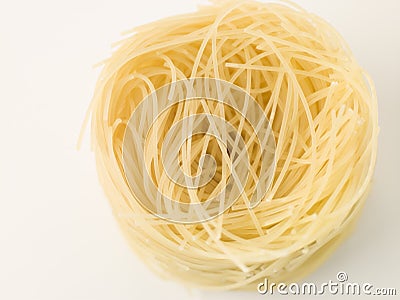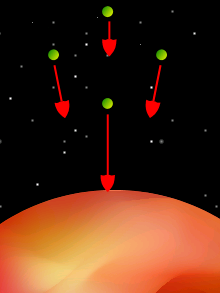Le présent billet a été rédigé par Jonathan Goldberg, que je remercie. Une traduction en français sera publiée prochainement sur ce blog.
These words share common etymological roots but they have widely different meanings.
“Vermicelli”, which exists in different forms in different countries, is a noodle that is thinner than spaghetti.
 |  |
Chinese vermicelli | Italian vermicelli |
Vermicelli literally means “little worms”. It comes from the Italian vermicelli, the diminutive form of verme, meaning a worm.
The word “spaghetti” also derives from the Italian word spago, which means “string” or “twine”.

A word that conjures up an association with spaghetti, but has nothing to do with food, is “spaghettification”. In astrophysics, this word (sometimes referred to as the noodle effect) means the vertical stretching and horizontal compression of objects into long thin shapes (rather like spaghetti) in a very strong gravitational field, and is caused by extreme tidal forces. In the most extreme cases, close to black holes, the stretching is so powerful that no object can withstand it, no matter how strong its components.

 |  |
I began this article with worms and, for my last word, I return to that subject. Extremophile (from Latin extremus meaning "extreme" and Greek philiā (φιλία) meaning "love") is an organism that thrives in physically or geochemically extreme conditions, which most other forms of life on Earth are unable to survive.
Recently, two kinds of worms, the roundworm and another new previously unknown species, have been found living in a South African mine, 1.3 kilometers beneath the surface of the Earth, starved of oxygen. This is the deepest-living "multi-cellular" organism known to science. This discovery has brought extremophiles out of their dark hiding places into the sunlight of scientific scholarship.
Une souche bactérienne hyperthermophile
Sources:
Vermicelli – Wikipedia (English)
vermicelli – Wikipedia (français)
Spaghettification, Wikipedia (English)
Spaghettification, Wikipedia (français)
Spaghettification and the problem of scientific jargon, BBC, March 8, 2011
Deepest-living land animal found, BBC Science and Environment, June 2, 2011
Worms from Hell, Public Radio International, The World
Extremophile, Wikipedia (English)
Extrêmophile, Wikipedia (français)
Extremophiles, video
Aucun commentaire:
Enregistrer un commentaire